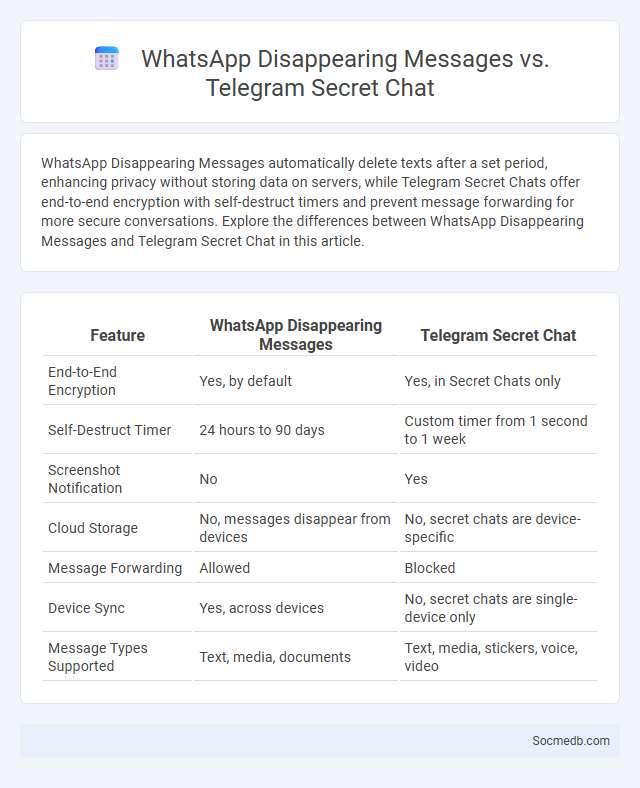
Photo illustration: WhatsApp Disappearing Messages vs Telegram Secret Chat
WhatsApp Disappearing Messages automatically delete texts after a set period, enhancing privacy without storing data on servers, while Telegram Secret Chats offer end-to-end encryption with self-destruct timers and prevent message forwarding for more secure conversations. Explore the differences between WhatsApp Disappearing Messages and Telegram Secret Chat in this article.
Table of Comparison
| Feature | WhatsApp Disappearing Messages | Telegram Secret Chat |
|---|---|---|
| End-to-End Encryption | Yes, by default | Yes, in Secret Chats only |
| Self-Destruct Timer | 24 hours to 90 days | Custom timer from 1 second to 1 week |
| Screenshot Notification | No | Yes |
| Cloud Storage | No, messages disappear from devices | No, secret chats are device-specific |
| Message Forwarding | Allowed | Blocked |
| Device Sync | Yes, across devices | No, secret chats are single-device only |
| Message Types Supported | Text, media, documents | Text, media, stickers, voice, video |
Introduction to Disappearing Messages in Messaging Apps
Disappearing messages in messaging apps enhance privacy by automatically deleting conversations after a set time, reducing digital footprints. Popular platforms like WhatsApp, Instagram, and Snapchat offer this feature, allowing you to control the lifespan of your shared content. This functionality supports secure communication, protecting sensitive information from unwanted access.
Overview: WhatsApp Disappearing Messages
WhatsApp Disappearing Messages automatically delete chats after a set duration, enhancing privacy and reducing digital clutter. You can choose timers ranging from 24 hours, 7 days, to 90 days, tailoring message lifespan to your needs. This feature supports secure communication by minimizing the digital footprint left in personal and group conversations.
How Telegram Secret Chat Enables Message Disappearance
Telegram Secret Chat employs end-to-end encryption and a self-destruct timer to enable automatic message disappearance, ensuring privacy and confidentiality. Users can set the timer to erase messages after they have been read or after a predetermined period, preventing any trace of the conversation. This feature enhances secure communication by protecting sensitive information from being stored permanently or accessed by third parties.
Comparing Management and Control of Disappearing Messages
Disappearing messages on social media platforms like Instagram, Snapchat, and WhatsApp offer varied levels of management and control, affecting user experience and privacy. Instagram and Snapchat provide automatic expiration and user-driven deletion options, while WhatsApp emphasizes end-to-end encryption for message security before disappearing. Understanding these differences helps you select the best platform to manage your temporary conversations effectively.
Security and Encryption: WhatsApp vs Telegram
WhatsApp utilizes end-to-end encryption by default for all messages and calls, ensuring that only you and the recipient can read or listen to them, making it highly secure for personal communication. Telegram offers encrypted chats through its Secret Chats feature, which uses end-to-end encryption, but regular chats are stored on its cloud servers with server-client encryption, which may pose privacy concerns. Choosing between WhatsApp and Telegram depends on your preference for default robust encryption versus flexible cloud-based messaging with optional secret conversations.
User Experience: Setting Up and Using Disappearing Features
Disappearing features on social media platforms enhance user experience by providing temporary content options that encourage authentic and spontaneous sharing. You can easily set up these features in your privacy settings, allowing stories, messages, or posts to vanish after a designated time, which supports digital privacy and reduces content clutter. These tools promote real-time interaction and increase engagement while giving users control over their shared information.
Limitations and Drawbacks of Each Platform
Social media platforms each have specific limitations impacting your experience and reach. Facebook faces challenges with algorithm changes that reduce organic content visibility, while Instagram's emphasis on visuals can limit detailed communication. Twitter's character limit restricts in-depth discussions, and LinkedIn may feel overly professional, reducing personal engagement opportunities.
Privacy Implications for Everyday Users
Social media platforms often collect extensive personal data, raising significant privacy concerns for everyday users regarding data misuse or unauthorized access. Users must be aware of privacy settings and implement strong security practices to protect their information from being exploited by advertisers or cybercriminals. Regularly updating apps and reviewing permissions can mitigate risks associated with data breaches and identity theft.
Use Cases: When and Why to Use Disappearing Messages
Disappearing messages enhance privacy by automatically deleting content after a set time, ideal for sensitive conversations or time-limited promotions. Brands use this feature to create urgency in marketing campaigns, encouraging immediate engagement and reducing content clutter. Social media users rely on disappearing messages to maintain confidential communication, avoid digital footprints, and foster more casual, ephemeral interactions.
Conclusion: Choosing the Right Platform for Secure Messaging
Selecting the right social media platform for secure messaging depends on factors like end-to-end encryption, user privacy policies, and platform reputation. Apps such as Signal and Telegram offer advanced security features designed to protect user data from unauthorized access. Prioritizing platforms with robust encryption protocols and transparent privacy practices ensures safer communication and minimizes risks of data breaches.
 socmedb.com
socmedb.com